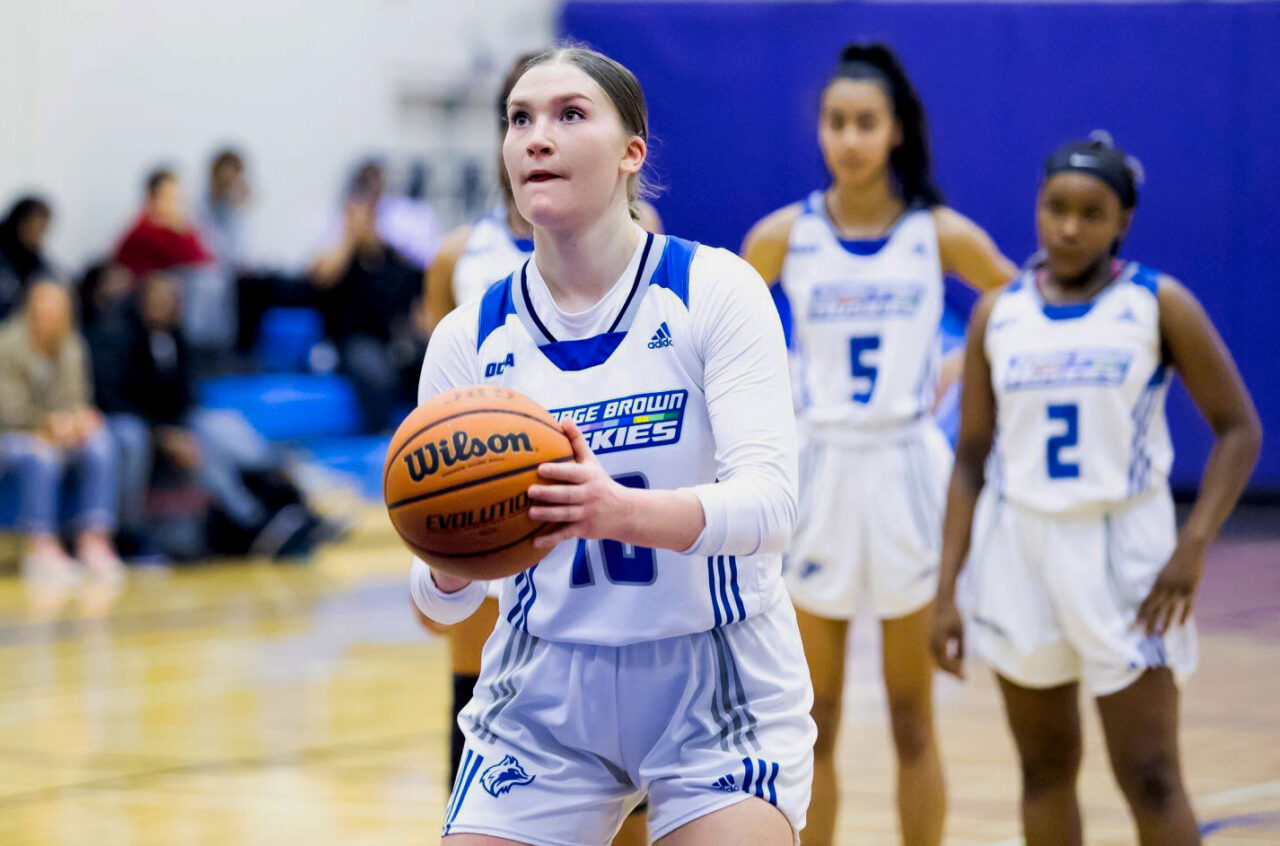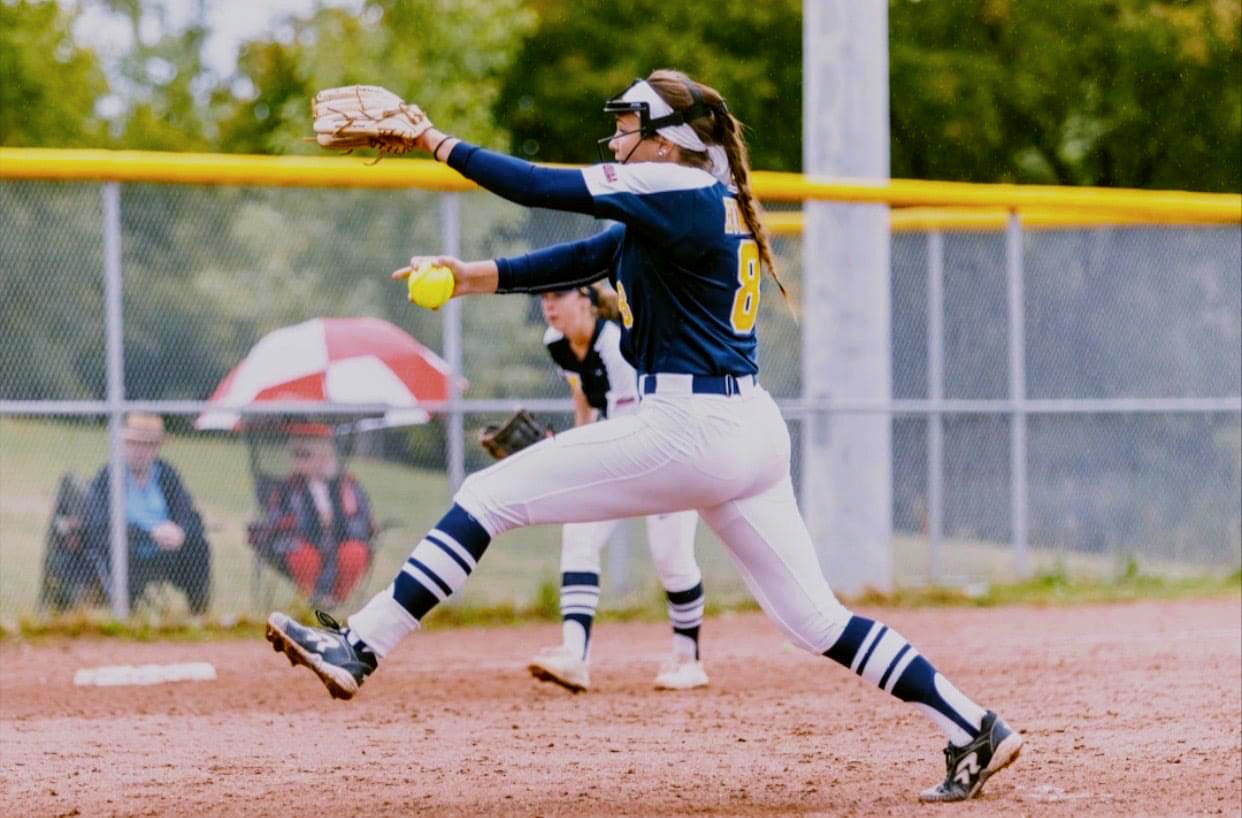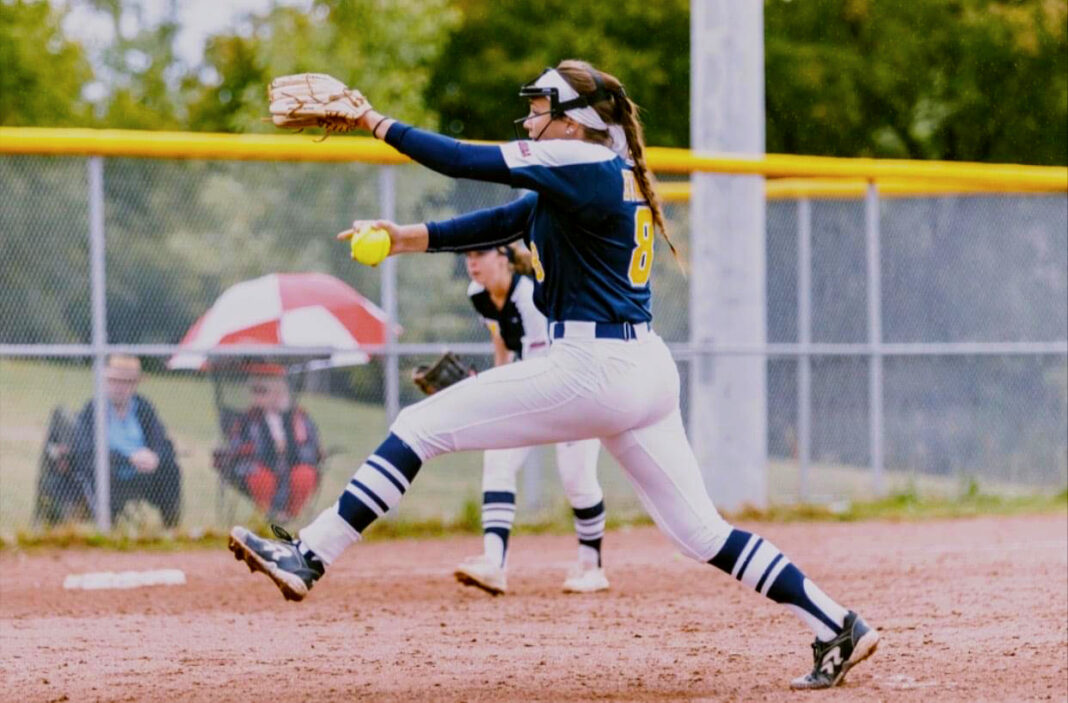By: Julia Alevato
For student-athletes, the last season of varsity sports in senior year is something special. The season represents the end of their college life, and it’s full of last chances and go-for-the-gold experiences.
It’s their last time representing their college, playing against their rivals, playing alongside their coach and teammates, and for most of them, it’s their last time playing an official match.
Not every varsity student continues in the sports field after they graduate, many embark on new careers and have little time to compete at the varsity level, so the final year is the last opportunity to compete on something they love.
Student-athletes are used to having routines and game schedules. But due to the COVID-19 pandemic and cancelled games, many weren’t able to do what they waited for years: to play as a senior.
“It was hard, because it’s your senior year, and that just gets taken away from you, as you don’t have a say on when you’re done playing. You are just forced into retirement,” said Coco Sauve.
Sauve graduated from George Brown College during the pandemic. She played on the basketball team for two seasons as a Huskie, and is now working at The National Basketball League of Canada (CBL) in British Columbia.
“I went to different colleges in Vancouver, and the community they have for basketball is not good. There’s not a great kind of system to fall into, and I don’t want to talk super generally, but I had a really bad experience with one of my coaches. My college and the department were not run properly, and there was not a lot of support for the athletes,”
“Toronto is the basketball hotspot of Canada, so I knew that if I wanted to have a good career at the post-secondary level, my best fit would be in Ontario. Warren Williams, who was the head coach when I played there, made me feel really comfortable with coming to Toronto, picking up my whole life and moving there to be on the team,” she said.
The last game Sauve played as a varsity athlete was at the 2020 OCAA Women’s Basketball Championship. The George Brown Huskies played in the quarter-finals and lost 66 to 74 to the St. Clair Saints.
“We lost, and I fell out of the game, so it was a terrible game to end my career. I didn’t know that it was going to be my last game, and ending on that one makes me so mad,” she said.
Other students like Presley Buchanan were lucky enough to finish their varsity career with a gold medal around their neck. She was a part of the Humber College softball team when they won the 2019 OCAA championship.
“I don’t like to admit this, but I was upset to find out that the season was cancelled. There was one night where it hit me, and my mom and I were sitting up crying. But my career ended on a good note, so I’m happy,” said Buchanan.
Her softball team won its first OCAA championship in 2013, and Buchanan was elected OCAA Pitcher of the Year. She was also the tournament MVP and joined Humber’s hall of fame. It’s hard to believe that she has considered stopping playing softball in the past.

“I grew up playing softball, and it was my passion. But after high school, I went to a school in the United States, where I played for two years. After those two years, I didn’t think I was ever going to play again because I hated the coaches from my school, and they ruined the sport for me, so my plan was not even to come back and play.”
“I was deciding between going back to school at all. I honestly felt like a dropout, so I decided to go to Humber and thought I might as well play since I’m going back to school anyways. Humber’s season is very short, so I knew it wasn’t going to be as intense as it was in the states, and I also had friends on the team who I got to reconnect with,” she said.
And although she won many titles during her time on the team, such as 2020 Humber College Female Athlete of the Year, she still misses some moments that were taken away from her due to the pandemic.
“Every senior gets a little award before the game, with flowers and announcements. And they did a little something this year for me. I went to one of their home games, and they gave me the jerseys, but it wasn’t like a real moment, you know?” she said.
Buchanan is still involved in sports but has decided to take a break from her pitching instructor job and is currently applying for policing as she just graduated from Police Foundations.
The pandemic hasn’t only affected the senior student-athletes. Coaches had to deal with the sudden loss of some of the team’s most important players, along with dealing with new protocols and finding ways to keep their team connected during this tough period.
“When we won in 2019 we had actually qualified for the 2020 National Championship, of which I would have had both Sarah Franchetto and Presly Buchanan. So not having the two of them, Presly, especially in an impact position that she plays, was huge…. Presly was the player of the year in 2019, and not having her at a national tournament definitely hurt,” said Humber College softball coach Duaine Bowles.
“Even this year when we lost our final game, our girls were emotional. And it’s not because they lost. It’s because you have five or six guys that are never going to play again, so that’s where a lot of people misunderstand why there’s so much emotion at the end. Because you know you got many players that won’t ever see the field again,” he said.
Once coach Bowles heard that softball season was cancelled due to the pandemic, he and the coaching staff worked on damage control to ensure that all the senior players were doing okay.
“We just ended their career with them maybe not being able to step on the field. You didn’t know that the last time that you left the field in 2019 was going to be the last time you ever played. And that was the hard thing. Those conversations were extremely hard,” he said.
Bowles has become Humber’s softball longest-tenured and winningest coach during his five seasons. And much of his guidance consists in keeping a tight-knit group, which was hard during the pandemic, as was the case for so many things done virtually.
“I do have to give my players a lot of props as they found ways to connect with each other weekly, through zoom and through some other stuff to keep the dynamic alive, but it’s definitely not the same. When we came out of the pandemic, we were lucky because we were able to get indoor facilities and do it in small groups, which was better than nothing,” he said.
A report by the Journal of Sport Psychologists in Action found positive responses in athletes who had mental support from their coaches. Approximately 700 athletes in the U.S. who competed primarily at NCAA Divisions I, II, and III and NAIA colleges and universities completed the survey.
“Athletes who perceived a more CTI (caring and task-involving) climate on their teams reported receiving greater support from their coaches and teammates. Athletes also indicated they were able to express more positive thoughts related to their ability to deal with the COVID-19 pandemic and use the time away for productive activities,” the research found.
Student-athletes can compete in the OCAA for a maximum of five years, and some of them even decided to take an extra course or join another program to get the chance to play as a senior.
Javonte Mitchell has found his way to continuing representing the Saints basketball team. He graduated from business administration at St. Clair College and is currently enrolled in a degree program at Nipissing University, as part of their partnership to offer a business degree completion program in four years. Both College and University have agreed to let all athletes continue representing the college.
That was a relief to Mitchell, who felt like he was not done playing yet. Now he can play for two more years until the end of his degree program.
“It was hard to have my last year taken by COVID, and I just felt like I could do more for the team and the community because I work on the board at the school too. I was always going to do this degree program pass, but they said that the University wasn’t allowing people to play, but then they finally let us do that,” he said.
An NCAA research study examined the impact of the COVID-19 pandemic on the physical and mental well-being of student-athletes during spring and fall 2020. Researchers found that student-athletes in their senior year and those attending classes fully virtually displayed heightened mental health concerns in the fall.
“The COVID-19 pandemic has led to modified graduation timelines and negatively impacted the career planning of seniors. Among seniors, 18 per cent of men and 12 per cent of women indicated they expect a delayed graduation date, and nearly half of all seniors reported losing or opting out of a job or internship, as a result of the pandemic. In terms of future career plans, 62 per cent of seniors felt the pandemic negatively impacted their career planning,” found the research.
“Not having basketball for a year made me realize what my life would be like without basketball. It was hard because sometimes when you have a lot of school work, you just want to relax and have fun, and I couldn’t do that. I couldn’t go and see my friends. Even the travelling that we did, I couldn’t go travelling and spend time, which was kind of a mental tool,” said Mitchell.
Now that he’s inside of the court and able to represent the Saints again, Mitchell is happy to be back and play the game. He’s also making plans to get into basketball coaching once college is over.
“I have a couple of career paths. I want to decide to be a cop or [to go] into business, but one of my coaches from back in London told me I could go on to coach the basketball team, so I want to get into coaching and maybe start coaching competitively,” he said.
The OCAA has approved fall sports formats for the upcoming 2021-22 varsity seasons, giving the currently senior student-athletes a chance to finish their varsity career.


